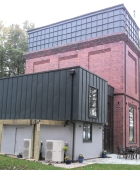Panasonic delivers efficient heating for converted water tower

An abandoned water tower on the outskirts of Harrogate has been converted into a stunning family home, helped by a Panasonic air-source heat pumps to provide low-carbon heating and hot water. The 4-storey water tower was built in the 1940s and was in need of refurbishment, having lain derelict for several years.
Carol and Majod Nadrey from Bradford were keen to design their home exactly the way they wanted it. The task of designing and installing the heating and hot-water system was entrusted to renewable-heating firm Heacol of Cumbria.
The installation had more in common with a new-build project than a retrofit, so Heacol was able to design the whole system.
The system is based on two Panasonic Aquarea T-Cap heat pump. It works well with underfloor heating, which was chosen as the primary method of delivering heating to the building to increase the efficiency of the system.
The T-Cap includes weather-compensation controls as standard. Heacol also installed proportional thermostats so that when the outside temperature drops below 17°C, the system will run 24 h a day. This method of operation enable a much lower flow temperature to be used, maximising operational efficiency.
Heacol also installed a thermal store to heat domestic hot water directly as required rather than storing it, with its associated risks of legionella.







